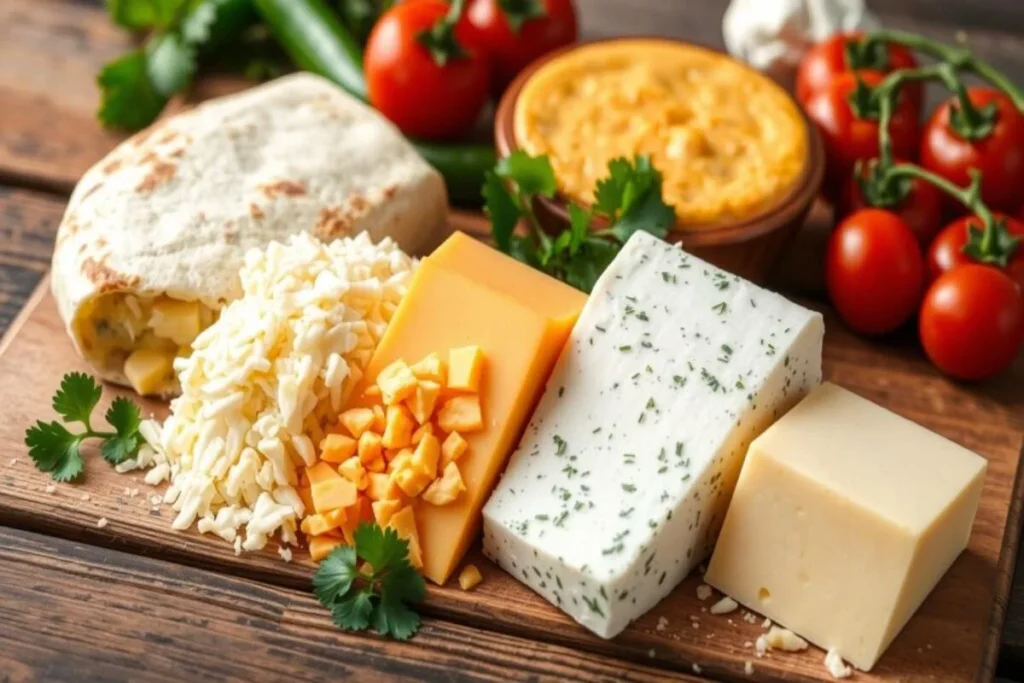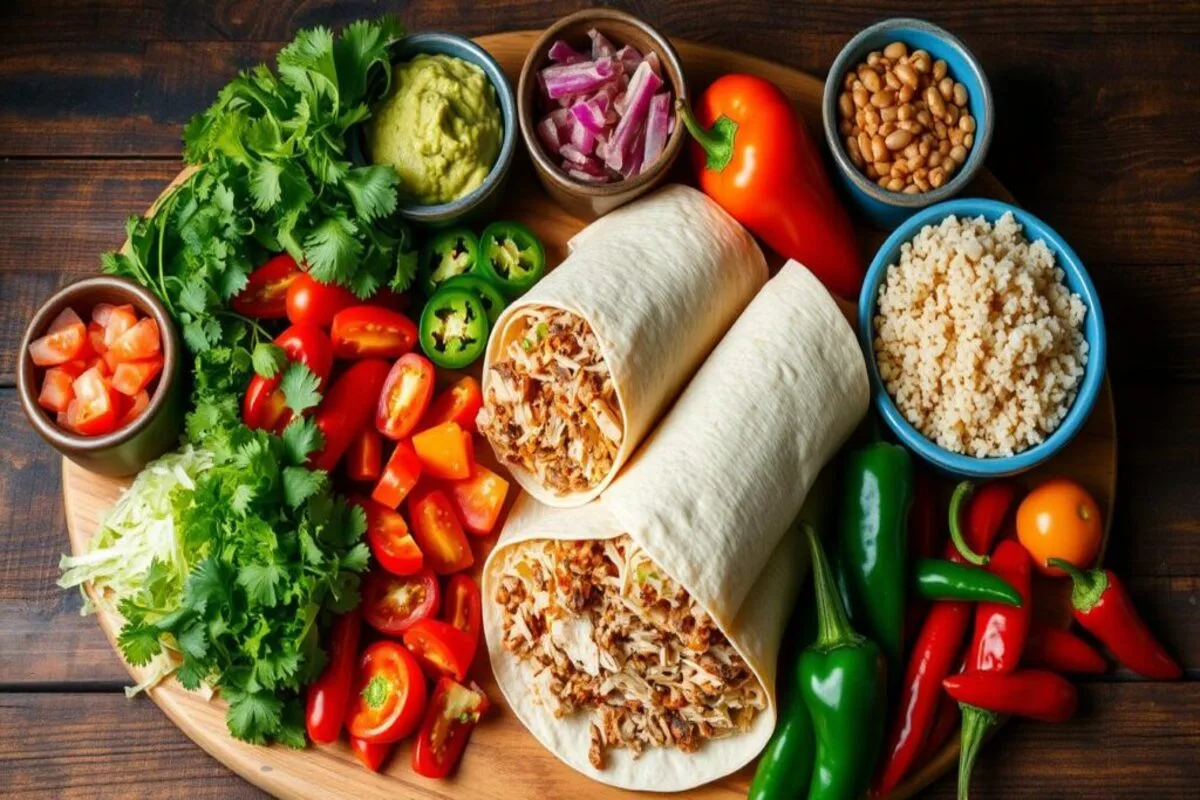The smell of sizzling meat and the softness of a fresh tortilla bring back memories. These are from my first experience with authentic Mexican burritos. Growing up in California, I found out a burrito is more than food—it’s a journey through Mexico’s rich food culture.
Exploring what Mexicans put in burritos, you’ll find a wide range of flavors. These flavors show the different traditions of each region. From Northern Mexico’s meaty burritos to coastal seafood ones, each tells a story of culture and family.
Every bite has layers of tender meat, fresh veggies, and spices. These are made with wisdom passed down through generations. These burritos are not just food; they’re a story of Mexican cuisine’s depth and complexity.
Let’s dive into the secrets of authentic Mexican burritos. We’ll explore the ingredients that make these handheld treats loved worldwide.
The History of Burritos in Mexico
The story of burritos is a fascinating journey through Mexican culinary traditions. These delicious wrapped meals have deep roots in Mexican cuisine. They evolved from simple street food to a global favorite. Traditional burrito fillings reflect the rich cultural heritage of Mexico’s diverse regions.
Origin of the Burrito
Burritos emerged in the northern Mexican state of Chihuahua during the early 20th century. The name “burrito” means “little donkey” in Spanish. This might refer to the rolled tortillas’ resemblance to a donkey’s ear or how they were transported by donkeys.
“A burrito is more than food – it’s a culinary story wrapped in a tortilla.” – Mexican Food Historian
Regional Variations
Mexican burrito ingredients vary dramatically across different regions. Northern Mexico developed distinctive burrito styles. These differ significantly from central and southern preparations.
- Chihuahua: Meat-focused burritos
- Sonora: Larger, flour tortilla-based burritos
- Mexico City: Smaller, more compact versions
The Evolution of Ingredients
Traditional burrito fillings have transformed over decades. Initially simple, with just meat and beans, modern burritos now include a wide range of ingredients. These reflect local tastes and agricultural products.
The culinary landscape continues to change. Chefs and home cooks experiment with innovative ingredients. They do this while respecting time-honored cooking techniques.
Common Ingredients Found in Burritos
Mexican cuisine brings a world of flavors to burritos. Traditional burritos are filled with rich, authentic ingredients. They make every bite a delight for food lovers.
Exploring the best burrito stuffing is key. Let’s look at the main ingredients that turn a simple tortilla into a masterpiece.
Proteins That Define Flavor
The choice of protein is vital for a real burrito. Traditional Mexican burritos often have:
- Carne asada (grilled beef)
- Carnitas (slow-cooked pork)
- Pollo (grilled chicken)
- Barbacoa (tender braised beef)
Vibrant Vegetable Selections
Vegetables add texture and nutrition. Popular choices include:
- Diced tomatoes
- Chopped onions
- Roasted peppers
- Fresh cilantro
Spices and Sauces That Elevate Taste
Mexican burritos shine with traditional spices and sauces. Chefs often add:
- Salsa roja (red sauce)
- Cumin
- Chili powder
- Fresh lime juice
“A great burrito is a perfect balance of proteins, vegetables, and authentic Mexican spices” – Mexican Culinary Expert
Together, these ingredients make a truly authentic Mexican burrito. They delight our taste buds and honor rich culinary traditions.
Authentic Mexican Burrito Fillings
Mexican burritos are a true art form. They use traditional fillings to turn simple ingredients into delicious meals. The secret to a great burrito is in its carefully chosen and prepared stuffing.
Authentic Mexican cuisine offers a wide range of fillings. These fillings add amazing flavor to every bite. Let’s look at the most loved meat fillings that make Mexican burritos stand out.
Shredded Beef: A Classic Delight
Shredded beef, or machaca, is a key part of burrito fillings. Chefs cook the beef slowly until it’s tender and easy to shred. They season it with a mix of:
- Dried chilies
- Cumin
- Garlic
- Salt
Carnitas: The Slow-Cooked Perfection
Carnitas are the best of pork cooking. They cook pork shoulder for hours until it’s tender and slightly crispy. This makes a filling that’s incredibly tasty.
“Carnitas are not just meat, they’re a celebration of flavor and tradition.” – Mexican Culinary Expert
Grilled Chicken and Beyond
Grilled chicken is a lighter but still tasty option. It’s marinated in citrus and spices, adding a fresh twist to burritos.
Mexican burritos are all about exploring flavors. They let food lovers discover a world of tastes with authentic ingredients.
The Role of Rice in Burritos
Rice is a key ingredient in Mexican burritos, turning a simple wrap into a filling meal. This grain is essential for the right texture and taste in traditional burritos.
Rice is loved in burritos because it soaks up flavors well. It also makes a great base for other tasty ingredients. Mexican cooking has made rice a must-have in burritos.
Why Rice Matters in Burritos
Rice does many things in a burrito:
- It adds bulk and makes the meal more filling
- It balances out strong flavors
- It gives important carbs
- It makes the burrito feel more complete
Traditional Rice Varieties
Mexican cooks often use two main types of rice for burritos:
- White Rice: It’s fluffy and great for soaking up flavors
- Mexican Red Rice: It’s seasoned with tomato and spices for extra taste
Preparation Techniques
“The secret to great burrito rice is in its preparation” – Mexican Chef
For authentic Mexican burritos, rice is cooked in a special way. Chefs toast the rice first to give it a nutty taste and prevent it from sticking together. They season it with garlic, onions, and tomato sauce to make it a main attraction.
Beans: A Key Ingredient in Burritos
Beans are a key part of traditional burritos in Mexican food. They add nutrition, flavor, and real character to this favorite dish.
Diverse Bean Varieties in Mexican Cooking
Mexican burritos feature a wide range of beans. Each type brings its own taste and texture. The most common include:
- Pinto beans – creamy and soft
- Black beans – rich and earthy
- Refried beans – mashed and seasoned
- Kidney beans – robust and hearty
Nutritional Powerhouse of Beans
Beans are not only tasty but also very good for you. They are full of protein, fiber, and important minerals. They help with digestion, give lasting energy, and add to the nutritional value of burritos.
“Beans are the secret weapon of Mexican cuisine, transforming simple meals into nutritional masterpieces.” – Mexican Food Expert
Authentic Bean Preparation Techniques
Mexicans cook beans for burritos with special care. They slow-cook them with onions, garlic, and spices to bring out the flavors. They season the beans with cumin, salt, and sometimes chili powder for a rich taste.
Whether mashed or left whole, beans are essential in Mexican burritos. They connect people through their simple yet deep culinary tradition.
Cheese Varieties in Mexican Burritos
Cheese makes Mexican burritos go from simple to spectacular. The right cheese can turn the best burrito stuffing into a mouthwatering experience. It’s a culinary delight that excites your taste buds.

Queso Fresco: The Classic Mexican Cheese
Queso fresco is a traditional Mexican cheese that adds a unique touch to burritos. It’s a fresh, mild cheese that crumbles easily. This gives burritos a light, creamy texture.
- Soft and crumbly texture
- Mild, slightly tangy flavor
- Perfect for cold or warm dishes
The Melting Magic of Cheese
Some cheeses melt into pure magic in a burrito. Oaxaca cheese and Chihuahua cheese are famous for their melting skills. They turn the best burrito stuffing into a gooey, irresistible treat.
“A great burrito is all about the perfect cheese blend” – Mexican Chef Ricardo Martinez
Flavor Influence of Cheese
Cheese does more than add texture to Mexican burrito ingredients. It brings unique flavors that can change a burrito’s taste. Sharp cheddar adds boldness, while mild monterey jack provides a creamy smoothness.
- Sharp cheddar – bold flavor
- Monterey jack – creamy texture
- Queso fresco – light and fresh
Salsas and Sauces: Enhancing Flavor
Salsas are the secret to making burritos special. They add flavor that turns a simple meal into a feast. These vibrant sauces make every bite exciting, creating a mix of tastes that people love.
Exploring salsas opens up a world of flavors. Each one changes your burrito in a unique way. It’s like discovering a new taste every time.
Types of Salsas Commonly Used
- Pico de Gallo: Fresh, chunky tomato-based salsa
- Salsa Verde: Green sauce made with tomatillos
- Roja Salsa: Spicy red chili-based sauce
- Roasted Tomato Salsa: Smoky and deep-flavored option
How Salsa Complements Burritos
Salsas make burritos taste better by adding flavor. They balance out the richness of meat and cheese. The mix of acidity and heat is perfect.
“A great salsa can elevate a simple burrito from good to extraordinary.” – Mexican Culinary Expert
Homemade vs. Store-Bought Salsas
Homemade salsas are fresher and better. When you make your own, you control the spice and quality.
- Homemade Pros:
- Fresh ingredients
- Customizable flavor
- No preservatives
- Store-Bought Pros:
- Quick and convenient
- Consistent taste
- Longer shelf life
Choosing homemade or store-bought, the right salsa makes your burrito amazing. It turns it into a delicious piece of Mexican cuisine.
Unique Burrito Fillings Across Mexico
Mexican cuisine is full of surprises, especially when it comes to burritos. Traditional fillings have grown, offering exciting new tastes beyond just meat.
Every region in Mexico adds its own twist to burritos. This makes every burrito a journey of flavors, far from the usual.
Seafood Burrito Options
Coastal areas in Mexico are known for their seafood burritos. These dishes are a treat for your taste buds. You’ll find:
- Shrimp with chipotle sauce
- Grilled fish with citrus marinade
- Octopus with fresh herbs
Vegetarian and Vegan Burritos
Today, Mexican food also includes plant-based options. Chefs make tasty vegetarian and vegan burritos with:
- Roasted vegetables
- Nopales (cactus)
- Mushroom-based proteins
- Quinoa and black bean mixtures
Fusion Burritos: New Takes on Tradition
Creative chefs are mixing old recipes with new ideas. Fusion burritos combine Mexican flavors with international tastes. This creates bold, new flavors.
“Innovation is the heart of Mexican cuisine, constantly reinventing classic dishes.” – Mexican Culinary Expert
Popular Burrito Toppings
Making the perfect burrito is an art. It’s more than just basic ingredients. The right toppings can turn a simple meal into a feast for the senses.
Choosing the best toppings is key. They add flavor, texture, and beauty to your burrito. Let’s look at some classic and creative options to make your burrito unforgettable.
Crisp and Fresh: Lettuce and Guacamole
Lettuce adds a nice crunch to your burrito. It contrasts well with the warm fillings. Guacamole makes it even better, with its creamy texture and rich avocado taste.
- Romaine lettuce for extra crispness
- Freshly made guacamole with ripe avocados
- Diced onions and cilantro in the guacamole
Creamy Delights: Sour Cream and Pico de Gallo
Sour cream adds a cool, tangy touch. It balances out the spicier parts. Pico de gallo, with its fresh tomatoes, onions, and cilantro, adds a burst of flavor.
“A great burrito is all about balance – and the right toppings make all the difference!” – Mexican Culinary Expert
Customizing Your Perfect Burrito
Burritos are all about being flexible. Feel free to try different toppings to make your own special burrito. Experiment to find your favorite mix.
- Start with a base of fresh ingredients
- Layer complementary flavors
- Add a touch of heat with hot sauce
- Finish with a sprinkle of fresh herbs
The best burrito is the one that makes you happy!
Burrito Sizes: How Big Should They Be?
When we talk about Mexican burrito ingredients, size is key. Burritos have grown from simple street food to a canvas for different tastes and appetites.
Exploring what Mexicans put in burritos shows us a lot about portion control. The size of a burrito is not just about filling up. It’s about making a meal that’s balanced and enjoyable.
Standard Size vs. Mega Burritos
- Traditional Mexican burritos are usually 6-8 inches
- Mega burritos can be up to 12-16 inches
- Where you are can affect how big a burrito is
Portion Control and Satisfaction
Authentic Mexican food is all about quality, not just how much you eat. A good burrito doesn’t have to be huge to be fulfilling. The secret is in the balance of ingredients and how they’re prepared.
“A great burrito is not measured by its size, but by its flavor.” – Mexican Culinary Tradition
Burrito Wrapping Techniques
- Pick the right tortilla size
- Spread out the ingredients evenly
- Fold the sides before rolling
- Make a tight, neat wrap
Whether you like your burritos small or big, it’s all about what you prefer and your cultural background.
Cooking Methods for Burritos
Making the perfect burrito is more than picking fillings. The cooking method can turn a simple burrito into a masterpiece. Learning the right techniques ensures a meal full of authentic Mexican flavors.
Grilling vs. Steaming: A Flavor Showdown
Choosing the right cooking method can make your burrito stand out. Grilling adds a smoky flavor to proteins, while steaming keeps them soft. Each method adds something special to your burrito:
- Grilling creates crispy edges and caramelized flavors
- Steaming maintains moisture and tenderness
- Hybrid methods can combine both techniques for complex taste
The Tortilla: Your Culinary Canvas
The tortilla is more than a wrapper; it’s the base of your burrito. Selecting and preparing the right tortilla is crucial. Warm tortillas are easier to handle, preventing tears and sealing your fillings perfectly.
Tips for Perfect Burrito Texture
Getting the perfect burrito texture takes practice and skill. Here are some expert tips:
- Warm tortillas on a griddle before filling
- Don’t overstuff – balance is key
- Fold carefully to prevent ingredient spillage
- Use gentle pressure when wrapping
“A great burrito is an art form, combining technique, flavor, and passion.” – Mexican Culinary Expert
Burritos and Their Global Adaptations
Mexican cuisine has started a global food revolution, with burritos at the forefront. Restaurants in places like Tokyo and London are making their own versions of burritos. They use local ingredients and unique flavors, making the dish exciting and new.
Influence of Mexican Cuisine Worldwide
Chains like Chipotle and Qdoba have helped spread burrito love across the U.S. and the world. They introduced people to real burrito toppings and made recipes fit local tastes. Chefs everywhere are putting their own twist on Mexican dishes, adding spices and ingredients that make burritos even better.
Popular Chain Restaurant Burritos
International restaurants are always coming up with new burrito ideas. In Australia, seafood burritos have taken center stage. Across Europe, Mediterranean twists like feta and olive tapenade add unique flavors. Meanwhile, in the U.S., barbecue and Southwest influences showcase the incredible versatility of burritos.
How Local Ingredients Change Burritos
Local flavors turn burritos into something amazing. Korean burritos might have kimchi, while Indian ones have tandoori chicken. These creative twists show how a simple Mexican dish can unite food lovers around the world.
FAQ
What are the most traditional ingredients in a Mexican burrito?
Traditional Mexican burritos have flour tortillas filled with proteins like shredded beef, carnitas, or grilled chicken. They also include rice, beans, and are often topped with queso fresco and salsa.
Are beans an essential part of an authentic Mexican burrito?
Yes, beans are key in authentic Mexican burritos. Pinto or black beans, whole or refried, add protein, flavor, and texture.
What type of rice do Mexicans typically use in burritos?
Mexicans use white rice seasoned with herbs and spices like cilantro, garlic, and tomato sauce. This creates a flavorful base for the filling.
Do all Mexican burritos include cheese?
Cheese is common but not required in Mexican burritos. Queso fresco, Monterey Jack, or cotija add richness and flavor.
What are some unique burrito fillings from different Mexican regions?
Coastal areas have seafood burritos, while central Mexico features nopal. Northern regions offer barbacoa, and vegetarian options include local vegetables and quelites.
How spicy are traditional Mexican burritos?
Spice levels vary by region and preference. Traditional burritos often include salsa or chile, from mild to hot, allowing diners to adjust.
Are vegetarian burritos common in Mexican cuisine?
Vegetarian burritos are popular, featuring beans, rice, grilled vegetables, nopales, and avocado as main fillings.
What sauces are typically used in authentic Mexican burritos?
Common sauces include salsa roja, salsa verde, pico de gallo, and guacamole. These add moisture, flavor, and complexity.
Do Mexican burritos always include guacamole?
Not always. Guacamole is popular but not mandatory. Its inclusion varies by region and preference.
What makes a burrito different from other Mexican wrapped foods?
Burritos are larger and use flour tortillas, unlike tacos which use smaller corn tortillas. They are fully enclosed and have a more substantial mix of ingredients.

